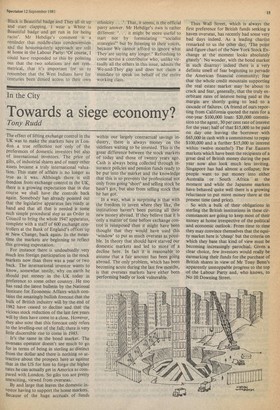In the City
Towards a siege economy?
Tony Rudd
The effect of lifting exchange control in the UK was to make the markets here in London a true reflection not only of the preferences of domestic investors but also of international investors. The price of gilts, of industrial shares and of many other assets became a truly international valuation. This state of affairs is no longer as true as it was. Although there is still freedom from exchange control in the UK, there is a growing expectation that in due course we shall have the controls back again. Somebody has already pointed out that the legislative apparatus lies ready at hand and that all that is needed is some such simple procedural step as an Order in Council to bring the whole 1947 apparatus, complete with a staff of 600 exchange controllers at the Bank of England's offices up at New Change, back again. In the meantime the markets are beginning to reflect this growing expectation.
For instance there is undoubtedly very much less foreign participation in the stock markets now than there was a year or two back. The international investor wants to know, somewhat testily, why on earth he Should put money in the UK today in preference to some other country. He too has read the latest bulletin by the National Institute for Economic Affairs which contains the amazingly bullish forecast that the bulk of British industry will by the end of 1982 have ceased to decline and that the vicious stock reduction of the last few years Will by then have come to a close. However, they also note that this forecast only refers to the levelling-out of the fall; there is very little discernible rise to come in 1983.
It's the same in the bond market. The overseas operator doesn't see much to go for in terms of being in sterling as distinct from the dollar and there is nothing so attractive about the prospect here as against that in the US for him to forgo the higher rates he can actually get in America as compared with London. So gilts too are pretty unexciting, viewed from overseas.
By and large that leaves the domestic investor having to support the home markets. Because of the huge accruals of funds within our largely contractual savings industry, there is always money on the sidelines waiting to be invested. This is the great difference between the stock markets of today and those of twenty years ago. Cash is always being collected through insurance policies and pension funds ready to be put into the market and the knowledge that this is so prevents the professional not only from going 'short' and selling stock he hasn't got, but also from selling stock that he has got.
In a way, what is surprising is that with the freedom to invest where they like, the institutions haven't been putting all their new money abroad. If they believe that it is only a matter of time before exchange control is reimposed then it might have been thought that they would have used this 'window' to put as much overseas as possible. In theory that should have starved our domestic markets and led to more of a decline here. In fact it is reasonable to assume that a fair amount has been going abroad. The only problem, which has been becoming acute during the last few months, is that overseas markets have either been performing badly or look vulnerable. Thus Wall Street, which is always the first preference for British funds seeking a haven overseas, has recently had some very bad days indeed. As a leading chartist remarked to us the other day, 'The point and figure chart of the New York Stock Exchange at the moment looks absolutely ghastly'. No wonder, with the bond market in such disarray: indeed there is a very definite smell of fear beginning to pervade the American financial community; fear that the whole credit mountain supporting the real estate market may be about to crack and fear, generally, that the truly exorbitant rates of interest being paid at the margin are shortly going to lead to a cascade of failures. (A friend of ours reporting from California quoted the rates for a one-year $100,000 loan: $20,000 commission to the agent, 30 per cent rate of interest for the year; half of that $15,000 to be paid on day one leaving the borrower with $65,000 in cash with a commitment to repay $100,000 and a further $15,000 in interest within twelve months!) The Far Eastern markets which have been the recipients of a great deal of British money during the past year now also look much less inviting. Singapore has had almost a collapse; few people want to put money into either Australia or South Africa at the moment and while the Japanese markets have behaved quite well there is a growing reluctance to put more money there at the present time (and price).
So with a bulk of their obligations in sterling the British institutions in these circumstances are going to keep most of their money at home irrespective of the political and economic outlook. From time to time they may convince themselves that the equity market here is 'cheap' but the criteria on which they base that kind of view must be becoming increasingly parochial. Given a clear choice, few investors would really be earmarking their funds for the purchase of British shares in view of Mr Tony Benn's apparently unstoppable progress to the top of the Labour Party and, who knows, to No 10 Downing Street.
































 Previous page
Previous page